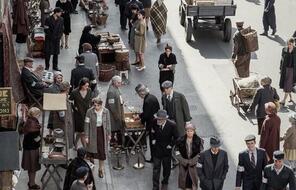The Jewish Councils
At a Glance
Language
English — USSubject
- History
- The Holocaust
As German forces occupied Poland and territories farther east, they forced each community of Jews to elect a Jewish Council, or Judenrat, which would enforce Nazi orders. Caught in an impossible position between the violent demands of Nazi officials and the overwhelming needs of Jews in the ghettos, most Jewish Council members struggled to do what was best for the people they were responsible for.
In ghettos, the Jewish Councils were given responsibility for organizing and maintaining everyday life in a community oppressed by scarcity, violence, and uncertainty. Jewish Councils were authorized to distribute food rations and supplies, manage access to medical care, and organize housing. Under German orders, Jewish Councils were also required to establish a Jewish police force that would carry out Nazi directives within the ghetto, including deportations from the ghetto to camps and killing sites. Often, the councils themselves were responsible for choosing which residents of the ghetto would be selected for work, deported to concentration camps, or sent to death camps (see Chapter 9, The Holocaust). Sometimes, members of the Jewish Councils and Jewish police forces had “privileges” not available to other ghetto inhabitants, such as access to more food for their families. Some residents of ghettos bitterly accused Jewish Council members of collaborating with the Nazis in exchange for such privileges.

Jews wearing Star of David badges in the Łódź ghetto. The Germans crowded 160,000 Jews from the Polish city, more than a third of its population, into the ghetto, which was established in 1940.
Minutes of a meeting of the Jewish Council in Vilna in October 1942 reflect the tremendous burden and unthinkable choices that were forced on these councils. Jacob Gens, head of the Vilna council, reported to his fellow council members on what happened when he was ordered to reduce the population of the nearby ghetto of Oszmiana:
Gens: Gentlemen, I asked you to come here today in order to relate to you one of the most terrible tragedies in the life of Jews—when Jews led Jews to their death. Once more I have to speak openly to you.
A week ago Weiss of the SD [an official from the Nazi security police] came to us in the name of the SD with an order that we were to travel to the Oszmiana. There were about 4,000 Jews in the Oszmiana ghetto and it was not possible to keep so many persons there. For that reason the ghetto would have to be made smaller—by picking out the people who did not suit the Germans, to take them away and shoot them. The first to go should be children and women whose husbands were taken away last year by the “snatchers.” The next to be taken would be women and families with a large number of children. When we received this order we replied: “At your command.”
Mr. Dessler [another member of the Jewish Council] and Jewish Police went to Oszmiana. After two or three days the Jewish Police observed. . . . that, first of all, the women whose men had been taken away last year were now working and could not be taken away, and, secondly, that there were no families with 4 or 5 children. The largest were families of two children. There were only a few [families] with three children. So that would also not work. (I forgot to say that no fewer than 1,500 persons had to be taken away.) We said that we could not provide such a number. We started to bargain. When Mr. Dessler arrived with the report from Oszmiana, the number dropped to 800. When I went to Oszmiana with Weiss, the number dropped again to 600. In reality the situation was different. We argued about the 600 and during this time the question of the removal of women and children was dropped. There remained the question of old people. In reality, 406 old people were collected in Oszmiana. These old people were handed over.
When Weiss came the first time and spoke about the women and children, I told him that old people should be taken. He answered: “The old people would die off in any case during the winter and the ghetto has to be reduced in size now.”
The Jewish Police saved those who must live. Those who had little time left to live were taken away, and may the aged among the Jews forgive us. They were a sacrifice for our Jews and for our future.
I don’t want to talk about what our Jews from Vilna have gone through in Oszmiana. Today I only regret that there were no Jews [i.e., Jewish Police] when the Aktion was carried out in Kiemieliszki and in Bystrzyca. Last week all the Jews were shot there, without any distinction. Today two Jews from Swieciany (Old-Swieciany) [a town near Vilna] came to me and asked me to save them. The Jews from Swieciany, Widze and other small places in the neighborhood were [collected] there. And today I ask myself what is to happen if we have once more to carry out a selection. It is my duty to tell them: my good Jews, away with you; it is not my wish to soil my hands and send my Police to do the dirty work. Today I shall say that it is my duty to soil my hands, because terrible times have come over the Jewish people. If five million people have already gone it is our duty to save the strong and the young, not in years only, but in spirit, and not to indulge in sentimentality. When the Rabbi in Oszmiana was told that the number of persons required was not complete and that five elderly Jews were hiding in a maline (hiding place), he said that the maline should be opened. That is a man with a young and unshaken spirit.
I don’t know whether everybody will understand this and defend it, and whether they will defend it after we have left the ghetto, but the attitude of our police is this—rescue what you can, do not consider your own good name or what you must live through.
All these things that I have told you do not sound sweetly to our souls nor yet for our lives. These are things one should not have to know. I have told you a shocking secret which must remain locked in our hearts. . . . 1
Gens was not the only Jewish Council leader asked to make decisions about which Jews would live and which would die. Historian Doris Bergen writes:
Faced with such dilemmas Jewish Councils responded in different ways. Some refused to cooperate and were killed by the Germans and replaced with more compliant men. Some committed suicide. Others tried to bribe or negotiate with the Germans, in the hope that sacrificing some Jews would save others. Many tried first to protect their own families, friends and the people who worked for them, especially the Jewish police. In the end, most members of Jewish Councils were killed, like other people in the ghettos. 2
Connection Questions
- What were the roles and responsibilities of the Jewish Councils? Why did the Nazis want to create these councils to carry out their orders?
- What dilemmas did members of the Jewish Councils face? How did Jacob Gens think through the moral dilemma that he faced?
- What did Gens mean when we wrote, “All these things that I have told you do not sound sweetly to our souls nor yet for our lives. These are things one should not have to know. I have told you a shocking secret which must remain locked in our hearts”?
- 1Yitzhak Arad, Yisrael Gutman, and Abraham Margaliot, eds., Documents on the Holocaust: Selected Sources on the Destruction of the Jews of Germany and Austria, Poland, and the Soviet Union (Jerusalem and Oxford: Yad Vashem and Pergamon Press, 1987), 440–44.
- 2Doris L. Bergen, War and Genocide: A Concise History of the Holocaust, 3rd ed. (Lanham, MD: Rowman & Littlefield, 2016), 150.
How to Cite This Reading
Facing History & Ourselves, "The Jewish Councils," last updated August 2, 2016.








